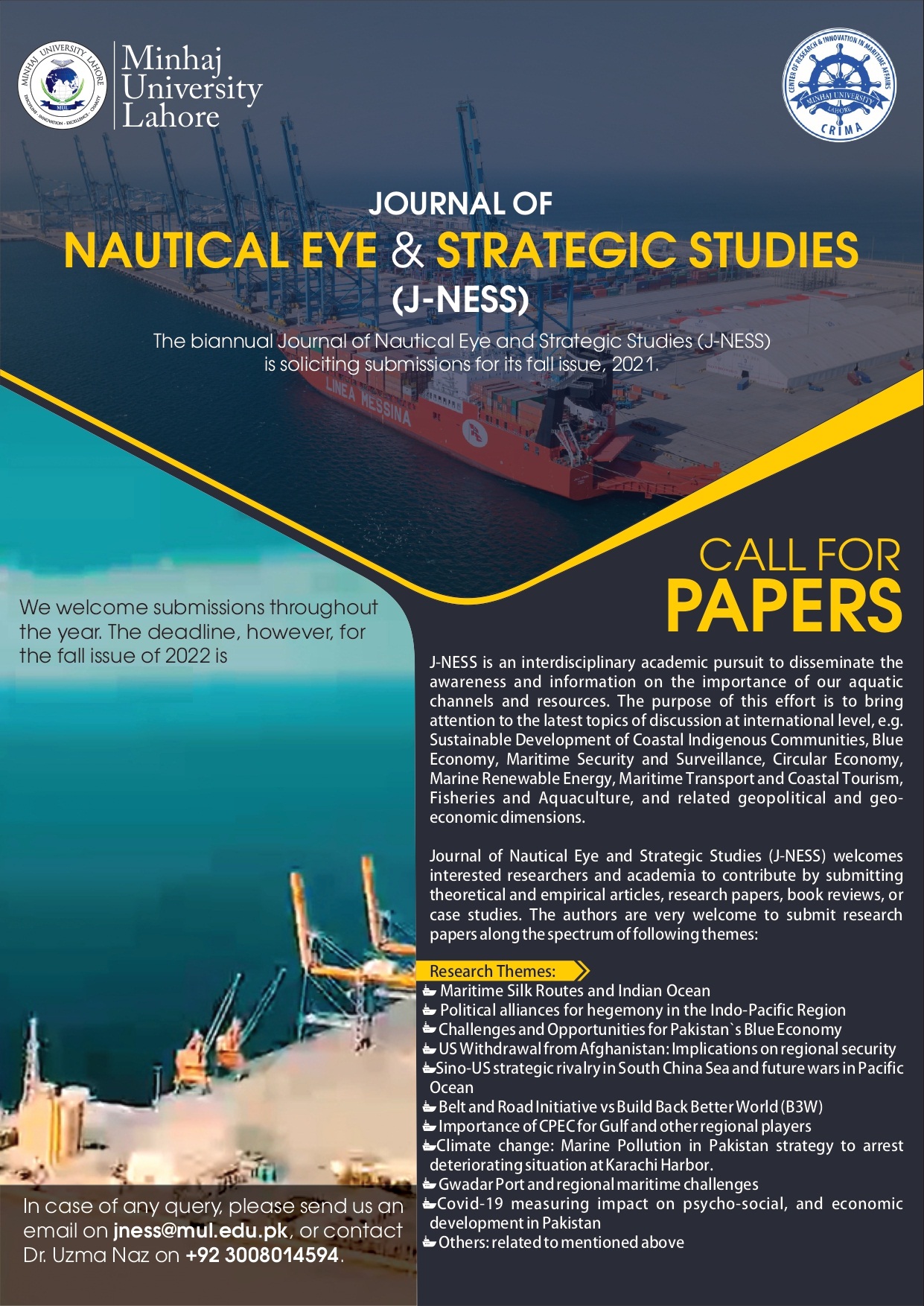Pakistan and Indian Ocean Region Geopolitics: Strategies and Counter Strategies
DOI:
https://doi.org/10.58932/MULG0032Keywords:
Indian Ocean Region, CPEC, Maritime Strategy, Geopolitics, BRI, Blue EconomyAbstract
Pakistan's strategies and counter strategies in the Indian Ocean Region (IOR) are influenced by various factors such as geographical context, economic linkages, and changing threat perceptions. The IOR is considered crucial due to its oil and gas reserves, choke points, and nautical traffic, attracting the interests of major powers like the USA, China, and India. China's presence in the IOR has increased through initiatives like the Belt and Road Initiative (BRI) and the China-Pakistan Economic Corridor (CPEC). Pakistan and China have developed mutually beneficial cooperation in the IOR. As far as India’s increased maritime influence is concerned it poses challenges and requires Pakistan to upgrade its naval potential, establish strategic cooperation with China, and focus on Blue Economy to counter the maritime strategy of India which imposes a severe threat to Pakistan’s presence in the IOR. This research paper examines India’s maritime partnerships in the IOR, and countermeasures taken by Pakistan to restrict the Indian influence in the IOR.
References
Ali, n. B. (2023). India’s maritime strategy and it’s implications for pakistan. India’s maritime strategy .
Bachraty, c. L. (2009). Biogeographic relationships among deep-sea hydrothermal vent faunas at global scale. . Deep sea research part i oceanographic research paper, 1371-1378. .
Bouchard, c. A. (2010). Neglected no longer: the indi ocean at the forefront of world geopolitics and global geostrategy. Journal of the indian ocean region, 26-51.
Brewster, d. (2014). Beyond the ‘string of pearls’: is there really a sino-indian security dilemma in the indian ocean? . Journal of the indian ocean region., 133-149.
Gul, s. A. (2021). Shifting national security paradigm of pakistan from geo politics to a geo economics era. . Global economics review, 81-94.
Hanif, s. (2017). Indian maritime doctrine: implications for pakistan's security. Ndu journal.
Harutyunyan, a. (2020). Middle east and north africa as a part of chinese string of pearls strategy. Ezikov svyat (orbis linguarum), 60-71.
Karim, a. N. (2023). Maritime dimension of modi’s foreign policy: indo-gulf maritime cooperation and its implications for pakistan. Liberal arts and social sciences international journal (lassij), 202-220.
Khan, c. (. (2019, february 12). Pakistan launches first formal maritime doctrine. Retrieved from pakistan defense: https://pdf.defence.pk/threads/pakistan-launches-first-formal-maritime-doctrine.608697/
Kurian, a. A. (2021). India and china in the indian ocean: changing dimensions of maritime strategy. . Journal of economic and social studies.
Nawaz, a. (2023, may 31). India’s evolving maritime strategy. Retrieved from southasian voice.
Paul, j. (2011). Emerging security architecture in the indian ocean region: policy options for india. Maritime affairs . Journal of the national maritime foundation of india, , 28-47.
Tahir, a. &. (2020). India-united states strategic partnership in indian ocean region and its implications for pakistan. . Journal of indian studies, 7-30.
Upadhyay, d. K. (2020). Blue economy: emerging global trends and india’s multilateral cooperation. Maritime affairs: journal of the national maritime foundation of india,, 30-45.
Upadhyaya, s. (2014). Maritime security cooperation in the indian ocean region: the role of the indian navy. . Australian journal of maritime & ocean affairs, 173-190.
Downloads
Published
How to Cite
Issue
Section
License
Copyright (c) 2024 Journal of Nautical Eye and Strategic Studies

This work is licensed under a Creative Commons Attribution-NonCommercial 4.0 International License.











